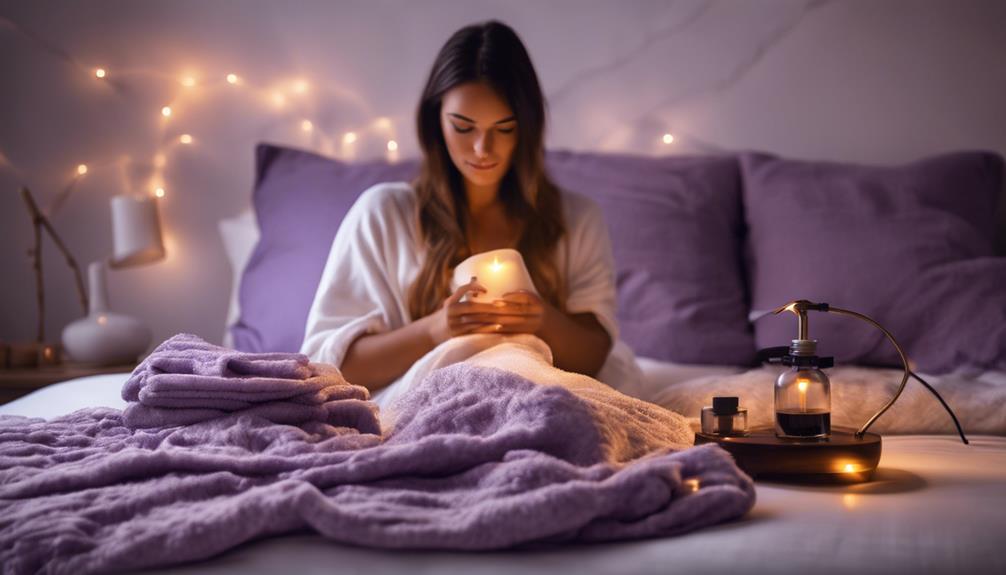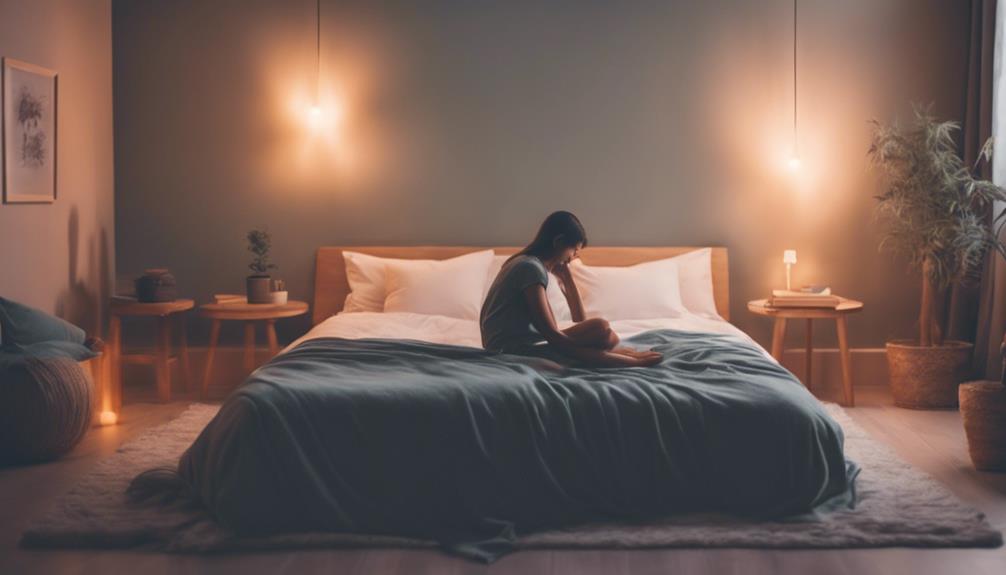Enhance sleep quality through health hypnosis by understanding sleep patterns, identifying disruptors, and utilizing deep relaxation techniques. Positive sleep affirmations, a bedtime ritual, and visualizing restful sleep can create a conducive environment for better sleep. Additionally, practicing self-hypnosis techniques can cultivate inner peace and tranquility to improve overall well-being. By incorporating these seven powerful methods, you can tap into your mind's potential for deep relaxation and achieve a restorative night's sleep. Master these techniques to unlock the key to a rejuvenating slumber and enhance your overall health and vitality.
Understanding Sleep Patterns

Understanding sleep patterns is essential for improving overall sleep quality and promoting better health and well-being. Sleep is divided into different stages, each playing a crucial role in the body's restoration and overall functioning.
The sleep stages consist of non-rapid eye movement (NREM) and rapid eye movement (REM) sleep, alternating throughout the night in a cyclical pattern. NREM sleep is further divided into stages 1, 2, and 3, with each stage contributing differently to the body's recovery and maintenance.
Moreover, our bodies follow a natural internal process known as the circadian rhythm, which regulates the sleep-wake cycle over a 24-hour period. This rhythm is influenced by external factors such as light exposure and daily routines, impacting our readiness for sleep and wakefulness.
Identifying Sleep Disruptors
Wondering what factors might be disrupting your sleep and affecting your overall well-being? Two key elements to consider are your sleep environment and stress management.
Your sleep environment plays a crucial role in determining the quality of your rest. Factors such as noise levels, lighting, and comfort of your mattress and pillows can all impact how well you sleep. Creating a peaceful and comfortable sleep environment can help promote better sleep quality.
Additionally, managing stress is essential for improving your sleep patterns. High levels of stress can lead to insomnia, restlessness, and overall poor sleep quality. Finding effective stress management techniques such as mindfulness meditation, deep breathing exercises, or engaging in relaxing activities before bed can help calm your mind and prepare your body for a restful night's sleep.
Deep Relaxation Techniques

Exploring deep relaxation techniques can be a powerful way to unwind both mentally and physically, paving the path for a more rejuvenating and restful sleep experience.
One effective method to achieve deep relaxation is through guided meditation. Guided meditation involves a trained practitioner or audio recording to lead you through a series of visualizations and calming techniques, helping you release tension and quiet the mind. This practice can enhance the mind-body connection, fostering a state of deep relaxation that is conducive to better sleep.
The mind-body connection is a fundamental aspect of deep relaxation techniques. By focusing on your breath, muscle relaxation, and positive imagery during guided meditation, you can create a harmonious balance between your mental and physical states. This synchronization can alleviate stress and anxiety, promoting a sense of calmness that carries over into your sleep routine.
Incorporating guided meditation into your bedtime ritual can signal to your body that it is time to unwind, setting the stage for a peaceful and restorative night's sleep.
Positive Sleep Affirmations
Incorporating positive sleep affirmations into your nightly routine can significantly enhance your overall sleep quality and well-being. Sleep affirmations are powerful statements that can help calm the mind, reduce stress, and promote a positive mindset before bedtime. By incorporating these affirmations into your bedtime routine, you can create a sense of relaxation and tranquility that is conducive to a restful night's sleep.
Positive sleep affirmations can be tailored to address specific concerns such as anxiety, racing thoughts, or difficulty falling asleep. Examples of sleep affirmations include 'I am calm and at peace,' 'My mind is quiet, and my body is relaxed,' and 'I release all tensions and embrace restful sleep.' By repeating these affirmations while lying in bed, you can shift your focus away from worries and towards a state of calmness and serenity.
In addition to sleep affirmations, combining them with relaxation techniques such as deep breathing, progressive muscle relaxation, or visualization can further enhance their effectiveness. This holistic approach can help you create a bedtime ritual that promotes deep, rejuvenating sleep and overall well-being.
Creating a Bedtime Ritual

Establishing a consistent bedtime ritual can significantly improve your sleep quality and overall well-being. A bedtime ritual helps signal to your body and mind that it's time to wind down and prepare for restful sleep.
To enhance this ritual, consider incorporating calming scents and soothing music. Calming scents like lavender, chamomile, or jasmine can create a relaxing atmosphere in your bedroom, promoting a sense of tranquility and peace. You can use essential oils, candles, or room sprays to introduce these scents into your bedtime routine.
Soothing music can also be a powerful tool to help you relax and de-stress before bedtime. Choose soft, instrumental music or nature sounds that can help calm your mind and lull you into a state of relaxation.
Visualizing Restful Sleep
One effective way to enhance sleep quality is by incorporating visualizations of restful sleep into your bedtime routine. Guided imagery can be a powerful tool in creating a mental environment conducive to relaxation and deep sleep. By engaging in guided imagery before bedtime, you can tap into the mind-body connection, allowing your thoughts to influence your physical state positively.
Visualizing restful sleep involves picturing yourself in a calm and peaceful setting, such as a tranquil beach or a cozy cabin in the woods. As you imagine these serene environments, focus on engaging all your senses – the sound of gentle waves, the warmth of a crackling fireplace – to deepen the relaxation response in your body.
This practice helps signal to your brain that it is time to unwind and prepare for a restorative night's sleep.
Practicing Self-Hypnosis Techniques

Discover effective self-hypnosis techniques that can be utilized to improve sleep quality and enhance overall well-being. Self-hypnosis is a powerful tool that allows individuals to enter a state of deep relaxation and heightened suggestibility, making it an ideal practice for promoting better sleep.
One technique that can be particularly beneficial is guided visualization, where individuals imagine peaceful and calming scenes to quiet the mind and prepare the body for rest. This method helps to reduce stress and anxiety levels, paving the way for a more restful night's sleep.
Another effective self-hypnosis technique for enhancing sleep quality is sleep meditation. By incorporating meditation practices into your bedtime routine, you can cultivate a sense of inner peace and tranquility that is conducive to falling asleep easily and staying asleep throughout the night. Techniques such as focused breathing, body scanning, and mindfulness can all be incorporated into your self-hypnosis practice to promote deep relaxation and improved sleep quality.
Experiment with different techniques to find what works best for you and enjoy the benefits of a more restful night's sleep.
Frequently Asked Questions
Can Health Hypnosis Cure Sleep Disorders Like Insomnia?
Hypnosis can be effective in providing relief for insomnia by targeting underlying psychological factors contributing to sleep disturbances. While individual results may vary, many find hypnosis to be a helpful tool in managing and improving sleep quality.
Is It Safe to Use Health Hypnosis for Improving Sleep Quality?
When considering the safety concerns of using health hypnosis to improve sleep quality, it's essential to consult with a qualified practitioner. Alternatively, exploring proven methods like cognitive-behavioral therapy can offer effective and safe solutions.
How Long Does It Take to See Results With Health Hypnosis?
The effectiveness timeline of health hypnosis varies among individuals. While some may notice improvements within a few sessions, others may require more time. It's important for patients to have realistic expectations and trust the process for optimal results.
Can Health Hypnosis Help With Recurring Nightmares?
Nightmare relief through health hypnosis can be effective in addressing recurring nightmares. Hypnosis can help identify and address root causes of distress, promote relaxation, and reframe negative thought patterns, leading to improved sleep quality.
Are There Any Negative Side Effects of Using Health Hypnosis for Sleep?
Potential risks of using health hypnosis for sleep include the possibility of false memories or heightened suggestibility. Misconceptions may arise about loss of control or dependence. However, when used correctly, the benefits can include improved sleep quality and relaxation.
Conclusion
In conclusion, incorporating health hypnosis techniques can greatly enhance sleep quality by addressing sleep disruptors, promoting relaxation, and creating a positive bedtime routine.
By practicing deep relaxation, positive affirmations, and visualization, individuals can improve their overall sleep patterns and achieve a restful night's sleep.
Developing a consistent bedtime ritual and utilizing self-hypnosis techniques can further enhance the effectiveness of these methods.
Embracing these strategies can lead to a more rejuvenating and fulfilling sleep experience.
